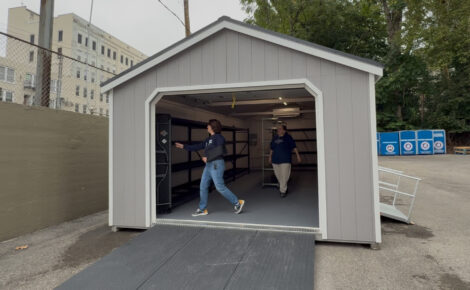Hardwoods industry worries about tariffs
Pennsylvania’s producers of hardwoods for lumber that is used in the manufacturing of fine furniture are facing pressure because of the reciprocal tariffs imposed on exports to China, which is a major importer of the Commonwealth’s timber product.
While there are changes, of late, the tariffs place, at risk, over 60,000 employees, including those at mills within a 100-mile radius of Williamsport, said Scott Seyler, executive vice president of international markets with Northland Forest Products, which is headquartered in Kingston, New Hampshire.
Seyler, who is based in Williamsport, has served as president of Keystone Wood Products Association for eight years and recently as chairman of the American Hardwood Export Council.
He is advocating for these lumber-dependent and family-operated operations.
There are operations in Emporium, Hillsgrove, Kreamer, Mill Hall, and Liberty, he noted.
“People need to understand the immediate economic impact on a state that employs a lot of folks in the hardwoods industry,” he said.
This region, because of its geographic location, is squarely in “the cross hairs,” when it comes to impact because of its logging operations and mills.
These employees share a “deep respect for and reliance on the state’s forest resources,” he said.
Recently, the administration declared a 90-day period in which the U.S. agreed to drop the tariff level to 30 % on goods coming in and China agreed to a 10 % tariff on U.S. goods coming into China, he explained.
The state is a “paragon” of responsible forest management and the tariff’s fiscal impacts can be seen in the numbers.
In 2024, Pennsylvania’s hardwoods lumber exports to China totaled $173 million, Seyler said.
When the reciprocal tariffs were set at 145 %, “business came to a complete halt.”
The state’s hardwoods producers stood to lose $130 million in sales to China, if the high level of tariffs would have stayed in place, he said.
The reality is the Chinese consume about 80 percent of the “American hardwoods” they import domestically for furniture into their country, Seyler added, a figure based on research by the American Hardwood Export Council.
Pennsylvania hardwoods are a superior product that is exported as kiln-dried lumber, he added.
“Red oak, cherry and walnut are beautiful types of wood,” Seyler said.
Lycoming County is familiar with timber.
It was once considered the ‘Lumber Capital of the World’ and the West Branch of the Susquehanna River provided a means of the logs floated on the water, captured and stored at booms in the water, where workers used hand tools to send to the mills lining the banks of Williamsport for processing.
The city became home to millionaires – including Peter Herdic and others who capitalized on this during the nation’s Industrial Revolution.
Lumber remains in the lexicon of Lycoming County, with its baseball team – the Williamsport Crosscutters – and a hotel with a room devoted to the lumber industry and the region’s hardwoods history.
Today, the rest of the world considers the United States’ forest management as an “American miracle.”
On top of their beauty and durability, there is an environmental story.
This state’s hardwoods are managed by companies with impeccable management skills, Seyler remarked.
For the layman, the process is the loggers go into the forest and cut down the trees, buck them to length and take them to saw mills using log trucks.
At the saw mills they are cut into boards and these saw mill operators use every part of the log. “Nothing goes to waste,” Seyler said.
From the middle of the log, railroad ties might be produced, when the bark is removed that is used for mulch and chips.
The wood to be exported is dried in kilns. Several loads of lumber may be in the kiln.
The lumber is bundled and put into the back of a 40-foot container, seen on the highways, to be taken to the ports and to be shipped overseas.
“A lot of Pennsylvania saw mills may ship up to 15 to 20 foreign destinations,” Seyler said.
Much of the wood ends up at the ports of Baltimore and New York, he said.
Asked if there were any indications of reversing the tariffs or changing their course, Seyler said: “We are certainly hoping the tariffs are reduced and restored to original levels.”
It was about 20 % on China before and it went up to 145 % until the most recent drop.
Initially, China’s response to the American tariff was imposing 125 % on the U.S.
Recent meetings occurred between Treasury Sec. Scott Bessent and Chinese officials in Switzerland to discuss trade between the countries.
Although Seyler is mostly concerned about China tariff the European Union also is considering a 25 % tariff on some hardwoods species.
Seyler said he is crossing his fingers there will be concessions and movement in the right direction.
The hardwoods industry has advocates from companies across the U.S. and contacted federal lawmakers about the impacts, he said.
“We are advocating for the protection of multi-generational family operations,” Seyler said.





